IBM CEO Arvind Krishna shared his perspective on AI, describing it as a valuable but not omnipotent technology, during a recent interview.
Krishna challenged Anthropic CEO Dario Amodei's prediction that 90% of code will be written by AI within the next three to six months. "I think the figure is closer to 20-30% of code potentially being generated by AI — not 90%," Krishna remarked. "Are there some very simple use cases? Yes, but there are also many complex scenarios where AI will contribute nothing."
Krishna emphasized that AI will enhance programmers' efficiency, boosting both their output and their employers', rather than eliminating programming jobs as some critics fear.
"If you can produce 30% more code with the same number of people, will you end up creating more or less?" he asked. "History shows that the most productive companies gain market share, allowing them to create more products and further expand their presence."
Unsurprisingly, IBM has a vested interest in portraying AI as non-threatening. The company offers a range of AI-powered products and services, including coding assistance tools.
Krishna’s stance marks a shift from his 2023 statement that IBM planned to halt hiring for roles expected to be replaced by AI. He compared debates about AI replacing workers to earlier concerns about calculators and Photoshop displacing mathematicians and artists. While acknowledging unresolved challenges around intellectual property in AI training and outputs, he ultimately views the technology as a positive and augmentative force.
"It’s a tool," Krishna said of AI. "If the quality of what everyone produces improves because of these tools, then even consumers benefit from higher-quality products."
Krishna predicted that such tools will become more affordable. Though he noted that models like OpenAI’s require immense computational power and energy, he believes AI could operate using "less than 1%" of current energy consumption thanks to innovations demonstrated by Chinese AI startup DeepSeek.
"I think DeepSeek has shown us that you can work with much smaller models," Krishna explained. "The question remains: do you still need very large models to start? That’s something [DeepSeek] hasn’t addressed." Despite AI becoming commoditized, Krishna doubts it will help humanity acquire new knowledge, echoing Hugging Face co-founder Thomas Wolf’s recent article. Instead, Krishna argues that quantum computing — an area where IBM has heavily invested — will be pivotal in accelerating scientific discovery. "AI learns from existing knowledge, literature, graphs, and so forth," Krishna stated. "It doesn’t try to figure out what comes next… I don’t believe this generation of AI will lead us to so-called artificial general intelligence… where AI possesses all knowledge, is entirely reliable, and answers questions beyond what Einstein, Oppenheimer, or any Nobel laureates could address." His view contrasts with OpenAI CEO Sam Altman’s belief that "superintelligent" AI is achievable in the near future and could significantly accelerate innovation.








